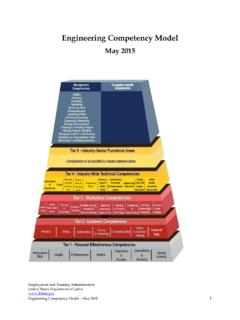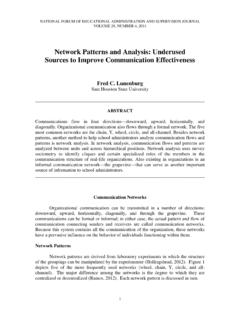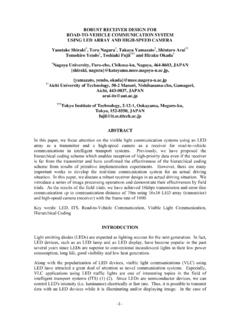Transcription of The Effectiveness of Health Care Teams in the National ...
1 The Effectiveness of Health care Teamsin the National Health ServiceReportCarol S. Borrill, Jean Carletta,Angela J. Carter, Jeremy F. Dawson, Simon Garrod,Anne Rees, Ann Richards,David Shapiro and Michael A. WestAston Centre for Health Service Organization Research,Aston Business School, University of AstonHuman Communications Research Centre,Universities of Glasgow and EdinburghPsychological Therapies Research Centre, University of LeedsContents_____Key FindingsAcknowledgementsHealth care team Effectiveness Project: SummaryChapter 1 Teamwork, Communication and Effectiveness in Health care : A ReviewPage 1 Chapter 2 Primary Health care TeamResearch Methods and Sample DetailsPage 25 Chapter 3 Primary Health care team Results from Surveyand External Ratings Page 44 Chapter 4 Qualitative Research: Developing Objectives andEffectiveness Measures for Primary Health care TeamsPage 57 Chapter 5 Community Mental Health TeamsResearch Methods and Sample DetailsPage 78 Chapter 6 Community Mental Health TeamsResults from Survey and External Ratings Page 103 Chapter 7 Community Mental Health TeamsResults from Qualitative ResearchPage 121 Chapter 8 Secondary Health care TeamsResearch Methods and Sample DetailsPage 141 Chapter 9 Secondary care Teams RatingsPage 157 Chapter 10 Meetings and CommunicationResearch MethodsPage 172 Chapter 11 Analysis of Communication in PHCT TeamsPage 182 Chapter 12 Analysis of Communication in CHMT'sPage 197 Chapter 13 Conclusions and RecommendationsPage 215 Appendix ISurvey Instruments/Rating Measures/Interview SchedulesAppendix IIKnowing the way.
2 Effectiveness in Primary Health CareAppendix IIID eveloping Effectiveness Measures for Primary Health care TeamsAppendix IVTraining Programme Tools and Techniques for AssessingPerformanceBibliographyAcknowle dgements_____Liaison Officers:Liz MeerabeauSue LongsdateJohn WilkinsonAdvisory Group Members:Debbie MellorsNHS ExecutiveSarah ConnorsNHS ExecutiveJim FordNHS ExecutiveBonnie SibbaldNHS ExecutiveEileen RobertsonNHS ExecutiveSheila RobertsDepartment of HealthTerry BreughaUniversity of LeicesterAnne NettonUniversity of KentThelma SackmanNHS ExecutiveResearch team :Dr Carol BorrillJanuary 1997 - December 1999 Aston Business SchoolAston UniversityBirminghamSam BedlinghamJune 1997 - December 1999 City UniversityLondonJean CarlettaJanuary 1997 - December 1999 Human CommunicationResearch CentreEdinburghChristine CarmichaelJune 1997 - February 1998 Institute of Work PsychologySheffield UniversitySheffieldAngela CarterJanuary 1998 - December 1999 Institute of Work PsychologySheffield UniversitySheffieldJeremy DawsonJuly 1999 - December 1999 Aston Business SchoolAston UniversityBirminghamSimon GarrodJanuary 1997 - December 1999 Human Communications Research CentreGlasgow UniversityGlasgowHeidi Frazer-KraussJanuary 1997 - June 1997 Medical SchoolGlasgow UniversityGlasgowAnne ReesJanuary 1997 - June 1997 Psychological Therapies Research CentreLeeds UniversityLeedsAnne RichardsJanuary 1997 - December 1999 Psychological Therapies Research CentreLeeds UniversityLeedsCarein ToddApril 1997 - May 1998 Institute of Work
3 PsychologySheffield UniversitySheffieldDavid ShapiroApril 1997 - May 1998 Psychological Therapies Research CentreLeeds UniversityLeedsMichael WestJanuary 1997 - December 1999 Aston Business SchoolAston UniversityBirminghamDavid WoodsJanuary 1998 - June 1999 Institute of Work PsychologySheffield University_____Summary_____A primary prescription that policy makers and practitioners have offered for meetingthe challenges facing the National Health Service is the development ofmultidisciplinary team working. The importance of team working in Health care hasbeen emphasised in numerous reports and policy documents on the National HealthService. One particularly emphasised the importance of team working if Health andsocial care for people are to be of the highest quality and efficiency:"The best and most cost-effective outcomes for patients and clients areachieved when professionals work together, learn together, engage in clinicalaudit of outcomes together, and generate innovation to ensure progress inpractice and service.
4 "Over the last thirty years this has proved very difficult to achieve in practice becauseof the barriers between professional groupings such as doctors and nurses. Otherfactors such as gender issues also influence team working. For example, arepredominantly men while the rest of the primary care service population ispredominantly women; community mental Health psychiatrists are predominantlymen, whereas the rest of the population of community mental Health Teams ispredominantly women, and in hospital settings the ranks of consultants continue tobe largely made up of men. Other factors which impede the creation of effectivemultidisciplinary Teams include multiple lines of management, perceived statusdifferentials between different professional groups, and lack of organisationalsystems and structures for supporting and managing Health care team Effectiveness Project was commissioned by the Departmentof Health .
5 The overall aim of the research described here was to determine whetherand how multidisciplinary team working contributes to quality, efficiency andinnovation in Health care in the objectives of the research were to establish: which team member characteristics such as age, gender, occupational group,experience, qualifications, and team size, influence how well the Teams worktogether; how team working processes, such as participation, reflexivity, communication,decision-making and leadership contribute to the Effectiveness of Teams ,particularly the quality of Health care and the development of innovative practice;The research programme was carried out over a three year period by a team ofresearchers based at the universities of Aston, Edinburgh, Glasgow, Leeds andSheffield. During the course of the study information on team working was gatheredfrom some 400 Health care Teams .
6 This involved consulting over 7,000 NHSpersonnel and a large number of NHS clients. Five National workshops were heldwith key representatives from primary Health care and community Health care . A widerange of research methods was used, including questionnaire surveys, telephoneinterviews, in-depth interviews, observation, focus groups and video and audio taperecordings of meetingsThe research was carried out in two stages: quantitative data collection from 100primary Health care Teams (PHCTs), 113 community Health care Teams (CMHTs) and193 secondary Health care Teams (SHCTs), and in-depth work with a sub-sample findingsEffectivenessQuality of teamworking is powerfully related to Effectiveness of Health care Teams : The clearer the team 's objectives The higher the level of participation in the team The higher the level of commitment to quality The higher the level of support of the more effective are Health care Teams across virtually all domains offunctioningInnovationQuality of teamworking is powerfully related to innovation of Health care Teams .
7 The clearer the team 's objectives The higher the level of participation in the team The higher the level of commitment to quality The higher the level of support of the more innovative are Health care Teams across virtually all domains offunctioningMental HealthThose working in Teams have much better mental Health than those working in loosergroups or working individually. The benefits appear to be due to: Greater role clarity Better peer supportThose working in Teams are also buffered from the negative effects of organizationalclimate and better the functioning of team with respect Clarity of objectives Levels of participation Commitment to quality Support for the better the mental Health of team members across all domains of Health performanceThere is a significant and negative relationship between the percentage of staffworking in Teams and the mortality in these hospitals, taking account of both localhealth needs and hospital size.
8 Where more employees work in Teams the deathrate is significantly lower (calculated on the basis of the Sunday Times MortalityIndex, Dr Foster; deaths within 30 days of emergency surgery and deaths afteradmission for hip fracture) and turnoverWithin Health care , those working in well functioning Teams are more likely to stayworking in their settings than those working in poorly functioning Community Mental Health and Primary Health care , where there is no clearleader/co-ordinator or where there is conflict over leadership team objectives areunclear, and there Low levels of participation Low commitment to quality Low support for innovation Poor team member mental Health Low levels of Effectiveness and innovationCommunicationCommunication, integration and regular meetings in PHC and CMC Health careteams are associated with higher levels of Effectiveness and innovation, yet thequality of meetings (particularly in Primary Health care )
9 Is often diversityDiversity of professional groups in Primary Health care is clearly linked to levels ofteam innovation. In newly formed Community Mental Health Teams , this relationshipdoes not appear. The same findings emerged from research carried out with 85breast cancer care teams2. 1 This finding is based on research recently completed by the research team at the Aston Centre forHealth Services Organisation Research (further details available from West or Borrill).2 This finding is based on research recently completed by the research team at the Aston Centre forHealth Services Organisational Research (further details available from West or Borrill).Conclusions Systematic and revolutionary organizational change is necessary if the positiveresults of this research are to be implemented in practice. NHS organizations have to developed as team -based, rather than hierarchical.
10 Structure, culture, work design, HRM and management have to accommodateand enable rather than impede team -based working. NHS employees should be trained in the KSAs for working in Teams . NHS managers should be trained to manage team -based 1 Teamwork, Communication and Effectiveness in HealthCare:A ReviewThe challenges of organising Health care in the modern United Kingdom context areconsiderable. There are continual improvements in medical technologies, greaterlevels of knowledge and awareness amongst patient populations and increasingdemands for the variety of sources of Health care available within the National HealthService. The provision of free Health care at the point of delivery to the populationhas become one of the most important issues in the National political agenda in theearly part of the twenty-first century. At the same time the National Health Servicehas become a massively complex institution characterised by large organisations,repeated restructurings, and subject to a wide range of political and economicpressures.










